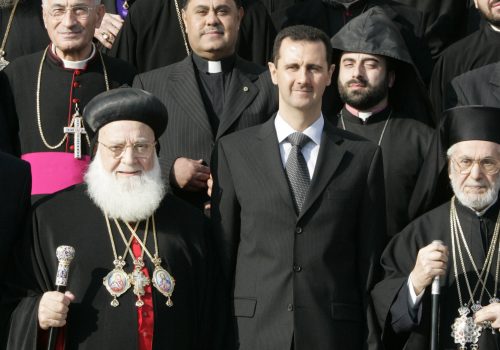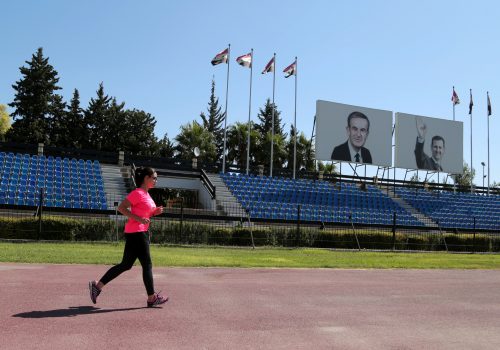Five decades of Baathism survived because of nationalism
Despite the fallout of the decade-long civil war, one thing that has remained constant in Syria is the Baathist regime’s domination over the Syrian people. Titles like ‘‘Who Won the Syrian War?’’ may seem to some as presumptuous, yet, it reflects more significant issues: that the debates about the Syrian war focus on the conflict, Syrian regime allies and their military support, and how this activity is translating on the ground. Some neglected aspects of the Syrian war are the assumption that the aim is to win and the conflict in Syria has routinely been portrayed within this framework. While this picture contains important elements of truth, a closer look suggests that beyond the purely military functions of violence is an ideology that has been perpetuated by the Baathist regime for five decades: an emotional nationalism that hinders transition to democracy. It does so by propagating emotional attachments to the nation and the leader as a form of identity and belonging in the Syrian state construct.
To coin the Syrian civil war as a proxy war is to ignore the layers of complexities that are part of the nation’s political culture. Such complexity is evident in the public marches of support for Bashar al-Assad since the 2011 uprising. While it is well-known that these marches were organized by the regime and enforced by security forces, many other Syrians and I have friends and family members who genuinely support Assad. For some of these supporters, this enforced order and coexistence are basic characteristics of an appropriate and legitimate polity. This brings us to the role of the regime’s national ideology, which has created the imaginary construct of a unified Syria and a “knowable” Baathist regime in the minds of Assad supporters against the uncertainty presented by the divided opposition.
Implicit in understanding the role of nationalism in maintaining the Assad regime’s survival is exploring the extent to which this ideology has given support to it. In their pursuit to solidify their authority and legitimacy, Hafez al-Assad and his son and successor, Bashar al-Assad, have relied on ideological sources that ensured obedience and loyalty. This “emotional nationalism” perpetuates involuntary and naturalized belonging to the nation on the premise of propagating primordial national ethos. In this type of nationalism, civic and modern concepts of citizenship are substituted with personalistic leadership, nepotism, and patrimonial relations. So far, scholars and pundits have failed to comprehend the role of “emotional nationalism” in instigating violence, obstructing the transition to democracy, and ensuring the Baathist regime’s survival in the Syrian context. Related to this oversight is underestimating the propagation of this particular type of nationalism—most prevalent in authoritarian regimes—in influencing group behavior, impacting political judgments and, consequently, producing political subjectivities.
Nevertheless, nationalism has perpetuated primordial belonging to the Syrian nation that is naturalized and familial. Rather than a free and rational choice to support beneficial civic institutions in Syria, love for the state and its leadership is presented as an involuntary romantic compulsion, heedless of thought or reason. The phenomenon of “Assadism” would not have been possible in the context of this nationalism. Identification with civic institutions tends to preclude an overemphasis on the power of any one individual. However, the romantic idealization of culture and homeland in Baathist ideology lent itself readily to being transformed into the love of an authoritarian leader.
Baathist ideology and loyalty through coercion
Over the last fifty years, the Syrian Baathist regime has made a habit of arranging or enforcing performative spectacles through countrywide marches that fill squares and streets, calling for love of the leader as found in other authoritarian regimes, such as North Korea and Iraq under Saddam Hussein. While it is difficult to distinguish between ‘‘public dissimulation of loyalty or belief, on the one hand, and real loyalty or belief, on the other,’’ the Baathist regime has focused on the use of nationalism to preserve and even extend state power. Its official narrative has invoked history and aspects of ‘Syrian exceptionalism’—that Syrians are a proud people with a profound history and have overcome colonization—to both define the Syrian nation and mobilize support. For the first three decades, the imposed Baathist ideology constructed Syrians as the children to a strong and omnipresent father figure, Hafez al-Assad. His son, Bashar, took on the same role once he ascended to power in 2000. Initially, many observers expected a softening of the authoritarian regime given that Bashar was regarded as a western-educated, youthful, and modern leader.
This initially was the case, as Bashar seemed poised to transition Syria towards a more civic and democratic style of governance. The new president moved quickly to encourage civic participation and de-militarize the national culture by ending mandatory martial education and changing school uniforms from the traditional soldier-like khaki to civilian colors like blue, pink, and grey. However, the younger Assad inherited from his father not only an entrenched state apparatus with significant vested interests, but also a decades-old legitimizing tradition founded on a romantic cult of homeland and personality. Unable to shake this status quo, Bashar oversaw a discursive adaptation in which the romanticism of the Assad personality cult increased, from the stern-yet-affectionate father image projected by Hafez al-Assad during his later years, to a more passionate, forceful, and dynamic presentation of the youthful Bashar as the new national leader.
Despite Bashar’s attempts to modernize rule in his early years—by emphasizing the necessity to develop rule of law and state institutions—he inherited a new political system ridden with cronyism, patrimonialism, corruption, and cynicism. As a result, presidential speeches, nationalist songs, and government-organized pro-regime rallies filled with slogans became fundamental in spreading the Baathist ideology and shaping the contours of belonging in modern Syria. It became almost impossible for a visitor to miss a governmental building, supermarket, or street wall covered with images and quotes from Hafez al-Assad. Similarly, students from primary school to university have long been encouraged to quote Hafez’s words when writings pieces on nationalism, which is a required subject in the Syrian education system. School essays on geography, history, literature, and many other topics must also have a patriotic tone. Examining Hafez’s speeches from that era reveals the continuation of the emotive and primordial nationalist ideals familiar from the earlier Baathist founders during the 1930s-1960s, now appended to the existing Syrian state and its leadership.
The current Assad regime still emphasizes the primordial aspect of this nationalism that focuses on family ties, bonds of love and loyalty, and involuntary belonging to the Syrian nation. These concepts began to appear as a distinct phenomenon against divided opposition and the rise of jihadi Salafist groups during the Syrian civil war. Bashar al-Assad, the “father of Syria,” was painted as a state leader that imposes stability.
This new phenomenon—“Assadism”—would not have been possible in a context of civic nationalism. Identification with civic institutions tends to preclude an overemphasis on the power of any one individual, but the romantic idealization of culture and homeland in Baathist ideology lent itself fairly readily to being transformed into the love of an authoritarian leader. As a result, the official national narrative post-2011 uprising has premised on conceptualizing this cultural identity as being ant-jihadist or extremist. Here, nationalism has diverged into a new type of nationalism, which celebrated bonds of love and loyalty to the Syrian state and its authoritarian regime.
Syria beyond ideological formations
What the future holds for Syrians in the post-Assad era is impossible to predict. What is certain, however, is that Syrians need to extricate themselves from the social and cultural programming of Baathist ideology. The intensely romanticized rhetoric utilized by the Assad regimes over the past five decades has weakened concepts of citizenship and rights, while heightening emotional attachments to the regime and helping to ensure its continued survival.
Today, Syria’s citizens have finally begun to cast doubt on their national sentiments and identity. For example, some Syrians living in northwest Syria, particularly in the Euphrates Shield and Olive Branch areas, now show increasingly emotional ties to Turkey. Others living in the northeast, such as the Kurds, have prioritized their sub-state or ethnic identity over their Syrian identity. Nevertheless, even if Assad is no longer dominating the nationalist narrative, there will still be competing narratives and questions about national identity that concern belonging and moving the nation forward.
There will be many questions to be answered, such as how the legacy of primordial national ideology affects transitions to democracy and how extensively Syrians have internalized the Baathist ethos and ideals. The struggle to establish civic notions of identity in Syria since the outbreak of conflict in 2011 has contributed to the rise of sub-state and supra-state affiliations, including a revival of previously submerged ethnic, tribal, and sectarian groups.
Will the Syrian war result in new subsets of national ideologies in various sectarian groups or different geographical regions of the country? The attempt to answer these questions is left to future scholars, as well as to Syrians.
Dr. Rahaf Aldoughli is a lecturer in Middle East and North African Studies at Lancaster University. Her areas of research expertise include identifying the ideological borrowings between European and Arab nationalism, the rise of the nation-state in the Middle East, the Syria crisis, militarism and the construction of masculinity in the Arab world.
Image: Syrian President Bashar al-Assad and his wife Asma, wearing face masks due to the Covid-19 pandemic, during a visit to a state-sponsored fair in Damascus for small businesses from Aleppo, northern Syria. Damascus, Syria, on November 4, 2020. Photo by SalamPix/ABACAPRESS.COM


